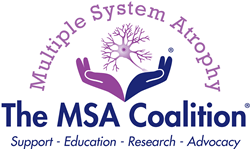
Our healthy financial position will enable us to enhance our activities around the four pillars of our mission: credible and relevant education, trusted emotional support, building a unified MSA community, and funding patient-centric research.
CHARLOTTE, N.C. (PRWEB)
July 07, 2020
The Multiple System Atrophy Coalition (MSA Coalition), the leading nonprofit funder of global MSA research, today announced the successful completion of its 2019 independent financial audit and the filing of its Form 990, reporting total revenue of $4.2 million. The rare disease nonprofit, which in addition to its research program also provides trusted emotional support, educational programs and advocacy leadership, continues an eight-year trend of remarkable revenue growth. Since making the decision to expand the board of directors and increase patient centered programs and services in 2012, the MSA Coalition has achieved a compound annual growth rate of 72%, increasing contributions from $54,500 in 2012 to $4.1 Million in 2019. This strong financial position places the organization in good stead to continue its leadership in the funding of critical MSA research. Furthermore, the MSA Coalition will be able to expand and improve its support and education for patients, care partners and medical providers.
“Keeping the MSA Coalition a strong and sustainable organization is paramount as we continue to focus on spending our funds in ways that most effectively support the patient and care partner community that we strive to serve,” says Cyndi Roemer, Chair, Board of Directors, The MSA Coalition. “Our healthy financial position will enable us to enhance our activities around the four pillars of our mission: credible and relevant education, trusted emotional support, building a unified MSA community, and funding patient-centric research that is so important to finding a treatment and ultimately a cure for multiple system atrophy.”
The MSA Coalition continues to carefully control its expenses with an outflow of $630,000 for the year. Of that, the majority, or 86.3%, was spent on programs, which are expenditures that directly benefit patients and care partners, such as research, patient education and support, education of medical professionals and raising awareness of MSA in the community at large. Overall, the Multiple System Atrophy Coalition ended the year with net assets of $5.4 million, of which $3.3 million is restricted, primarily to research.
“I am pleased to report the MSA Coalition had a successful year overall. The results were driven by grassroots fundraisers and individual donations combined with several large bequests from patients who lost their battle with MSA but remembered all the patients still fighting,” stated Carol Langer, Treasurer, Board of Directors, the MSA Coalition. “Because of these incredibly generous patients and the continued grassroots fundraising by the MSA community, we ended 2019 with total contributions of $4.1 million and total revenue, including interest income, of $4.2 million.
“The 2019 financial results will allow the MSA Coalition to build upon the more than $2 million already granted to research projects at 29 institutions worldwide since the inception of the research funding program in 2013,” continued Langer. “While donations and fundraisers remain critically important, managed carefully, our assets, including the generous bequests we received in 2019, will enable us to expand our funding of promising research and to serve the patient and care partner population with trusted information and emotional support for the next several years.”
As potential donors consider charitable giving, the MSA Coalition encourages the review of financials such as 990s and to evaluate each charity on criteria developed by nonprofit watchdog groups. The MSA Coalition will continue to rely on generous contributions and fundraisers in order to maintain the momentum towards improving quality of life and building hope for those impacted by multiple system atrophy.
To learn more about how you can help, please visit the MSA Coalition fundraising page or call our business line toll-free at 866-737-4999.
About the Multiple System Atrophy Coalition
The Multiple System Atrophy (MSA) Coalition is a positive beacon of hope standing up to a little-known, rare, insidious disorder. Since 1989, the MSA Coalition has been devoted to improving the quality of life and building hope for people affected by multiple system atrophy by focusing on a four-pillar mission:
- Providing patients and caregivers with trusted and compassionate emotional support
- Educating patients, care partners and healthcare professionals with credible, critically important and relevant information
- Funding patient-centric collaborative research aimed at alleviating symptoms, slowing disease progression and discovering a cure
- Building a sense of community by connecting and unifying people affected by MSA.
Thousands of participants benefit from the annual MSA Coalition Family Conference, which is live streamed and posted online. With multiple online discussion groups and a dedicated support line, someone is always there to help. As the host of the first-ever Global MSA Advocacy meeting, the MSA Coalition works with other like-minded charities to foster a community of support and care, while also playing an important role in global MSA research efforts.
Learn more at http://www.multiplesystematrophy.org/ or call our support hotline toll-free at 866-737-5999.
About Multiple System Atrophy
Multiple system atrophy, previously known as Shy-Drager Syndrome, is a rare and fatal disorder with less than 15,000 Americans diagnosed and 35,000 undiagnosed at any given time. According to the National Institutes of Health, “Multiple system atrophy is a progressive neurodegenerative disorder characterized by symptoms of autonomic nervous system failure such as fainting spells (neurogenic orthostatic hypotension) and bladder control problems, combined with motor control symptoms such as tremor, rigidity, and loss of balance and muscle coordination.” MSA affects both men and women primarily in their 50s. MSA tends to advance rapidly over the course of 6 to 10 years, with progressive loss of motor skills, eventual confinement to bed, and death. There is no cure or remission from the disease.
Share article on social media or email:

